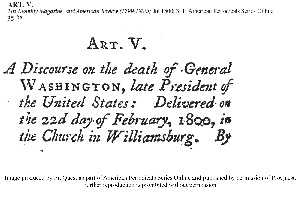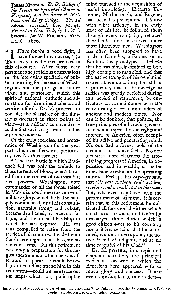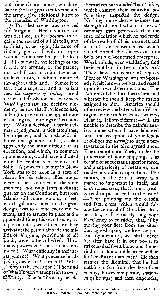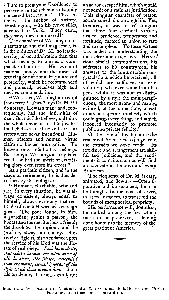 ―58― ―58―
Art. V.
A Discourse on the death of General
Washington, late President of
the United States: Delivered on
the 22d day of February, 1800, in
the Church in Williamsburg. By
 ―59― ―59―
James Madison, D. D. Bishop of
the Protestant Episcopal Church in
Virginia, and President of Wil-
liam and Mary College. The 2d
edition—corrected. 8vo. pp. 42.
Printed in New- York, by T. & J.
Swords, for W. Prichard, Rich-
mond. 1800.
“I Have fought a good fight, I
have finished my course,” (2
Tim. iv. 7.) is the text prefixed to
this discourse. After some very
pertinent and judicious observations
on the interesting spectacle of pub-
lic mourning for the death of Wash-
ington, and the presage of future
virtue and patriotism, which this
spirit of national gratitude and ad-
miration for his eminent talents and
services affords, Dr. M. proceeds to
consider the character of the illus-
trious deceased in three points of
view—as a military commander—
as the first civil magistrate—and as
a private citizen.
Of the early exercises and prepa-
ration of Washington for the great
part which he afterwards perform-
ed, Dr. M. thus speaks:
“The fatal battle in which Brad-
dock fell was only the prelude to
those torrents of blood, which flow-
ed from the contest of two vast but
rival powers. Washington, now
commander of all the forces raised
in Virginia, continued the career of
military glory, which he had so hap-
pily commenced, until his constitu-
tion, naturally strong and robust,
became debilitated, by incessant fa-
tigue, and the unusual hardship to
which he was exposed. He was
thus compelled to retire from the
service of his country, attended with
the sincere regret of all his compa-
nions in arms. But this retirement
was only a preparation for the au-
gust theatre upon which he was af-
terwards to appear. It would be de-
lightful could we attend him in this
retirement—could we here trace out
the steps which his philosophic
mind pursued in the acquisition of
useful knowledge. Hitherto Tu-
renne, Marlborough, and Eugene,
had been his preceptors. I know
with what ardency, in the early
stage of his life, he followed them
through every campaign, retraced
their battles, and thus served under
those illustrious men. Washington
has often been supposed to have
made a Camillus, a Fabius, or an
Emilius, his prototype. I believe
that he was himself destined to be a
high example to mankind, and that
the native strength of his own mind
soared above imitation; but still it
is probable, that his knowledge in
tactics was greatly perfected during
this period of retirement, by cul-
tivating an acquaintance with the
most distinguished commanders of
ancient and modern times. Nor
can it be doubted, that politics, the
true principles of all lawful govern-
ments, and especially the rights and
interests of America, often occupi-
ed his active and penetrating mind.
No one had a firmer hold of the
chain of causes and effects. No one
saw with more clearness the asto-
nishing progress of America, in po-
pulation and in wealth, or better
knew how to estimate the operating
causes. Perhaps his eagle-eye saw,
that this vast continent could not long
revolve round a small spot in the ocean.
But, whatever may have been the
presentiment of his mind, it is cer-
tain that in this retirement he cul-
tivated all those social virtues which
attach man to man, and faithfully
discharged those duties which a
good citizen owes to his country;
nor is it less certain, that he conti-
nued, without interruption, the ac-
tive friend of religion, and at no
time forgetful of his God.”
Dr. M. presents, in a rapid and
eloquent narrative, the principal
events of the war in which the
American hero appeared with so
much glory and success. These
events are familiar to our readers—
 ―60― ―60―
but some circumstances, which re-
late to the last great atchievement of
the army, give additional lustre to
the character of Washington.
“That last scene was reserved
for Virginia. Her favourite son
was destined, in her bosom, to re-
ceive the reward of all his toils, and
to finish, in her sight, his career of
military glory. I will not open
wounds which are but just healed;
I will not awake the feelings of the
friend, the orphan, or the parent;
nor will I call to mind the accu-
mulated distress which mourned
throughout this land. Suffice it to
say, that a superior and a gallant
foe, the conqueror of India, spread
terror and desolation on every side.
Washington saw the decisive mo-
ment; he saw that Providence had,
at length, presented the opportunity
of closing the sufferings of his coun-
try. With a decision, a profound-
ness of judgment, which astonishes,
he projected, and formed, with his
brave and generous allies, a plan
apparently the most difficult in its
execution, and which, to common
apprehension, would have indicated
only the feebleness of vanity and
folly. A powerful enemy in New-
York was to be kept in a state of
alarm for his safety; allied troops
were to be assembled at the same
moment, not only from a distant
quarter on the Continent, but from
Islands still more remote; a fleet,
which gallantry aided in the great
design, was to second every move-
ment, and to assume its place at the
appointed time; his own troops, by
rapid marches, were to ensure their
arrival at the period affixed; the mi-
litia of Virginia, provisions of all
kinds, were to be collected. How
many powers were here to be com-
bined! What difficulty in their ar-
rangement! What prudence in ad-
justing means so discordant! What
secrecy in the execution! The mind
of Washington was superior to every
difficulty. The hostile army beheld
themselves surrounded by a force,
which ensured their captivity be-
fore they suspected the design.
Nothing more clearly evinces the
strength of mind which this extra-
ordinary man possessed, than the
sure calculation which he had made
of the result of all his measures, and
also of the consequences which
would attend the success of this
bold but well-concerted enterprise.
Weak minds, ever vacillating, find
their emblem in the aspin's leaf.
They have no centre of repose.
That of Washington was self-pois-
ed; it felt its own weight, and rested
upon its own determinations. The
Admiral of the allied forces hesitated
whether he should keep the station
assigned to him. America should
often review the letter which Wash-
ington wrote to him from this city.
Hear it, fellow-citizens:—‘I am
unable to describe the painful anx-
iety under which I have laboured
since the reception of your letter.
It obliges me warmly to urge a per-
severance in the plan agreed upon.
The attempt upon York, under the
protection of your shipping, is as
certain of success as a superior force,
and a superiority of measures, can
render any military operation. The
capture of the British army is a
matter so important in itself, and
in its consequences, that it must great-
ly tend to put an end to the war.'
—After pointing out the certain
and fatal event which would fol-
low the removal of the allied fleet,
he adds, ‘I earnestly beg your
Excellency to consider, that, if by
moving your fleet from the situa-
tion agreed upon, we lose the pre-
sent opportunity, we shall never
hereafter have it in our power to
strike so decisive a blow, and the pe-
riod of an honourable peace will be
farther distant than ever.’ He then
assures the Admiral, that he had
nothing to fear from the fleet of the
enemy, however superior, station-
ed as he was; and then concludes,
 ―61― ―61―
‘I am to press your Excellency to
persevere in the scheme so happily
concerted between us.'—This let-
ter was the anchor of victory.
Washington, with his brave allies,
advanced to York. They came,
they saw, they conquered!”
The character of Washington, as
a statesman and civil magistrate, is,
in the opinion of Dr. M. no less de-
serving of our admiration than that
which belongs to him as a com-
mander of armies. His system of
national policy, and the means of
securing our national happiness and
prosperity, which he recommended
and pursued, receives high and
merited commendation.
“Was, then, Washington exempt
from error? This,” says Dr. M. “I
do not say. He was a man; and, con-
sequently, had the infirmities of
man. But this I do believe, and think
the whole tenor of his life justifies
the belief—that, if he did err, his
errors were never intentional. Hu-
man wisdom and human virtue
claim no higher prerogative. To
heaven only infallibility belongs.
But though Washington may have
erred, he had the merit of extract-
ing glory even from his errors.”
As a patriotic citizen, and in the
shade of retirement, he is thus de-
scribed by this enlogist:
“Humane, charitable, wise and
just, in every situation, he was al-
ways consistent, always equal to
himself, always evincing that rec-
titude of conduct was his sovereign
good. The poor found, in him,
a guardian; genius a patron; the
honest and the meritorious a friend;
the dissolute, the impious, and the
profane, always an enemy. Sin-
cerely religious, his attendance upon
the service of his God was the dic-
tate of real piety. Such his modesty,
that whilst he was the admiration of
all, he alone, like Moses, descended
from the mount, seemed ignorant of the
light which shone around him. Such
his prudence, that not a word, not
an action escaped him, which would
not admit of a rational justification.
This singular character of reason
accompanied him through life. Yes,
brethren, it was in Washington
that those four cardinal virtues,
justice, prudence, temperance and
fortitude, formed an union so rare
and so complete. To these virtues
was added an understanding the
most clear and extensive. His va-
rious official communications, his
addresses to his countrymen, his
answers to the innumerable con-
gratulations which he received, all
of which are sufficient to form
volumes; whatever came from his
pen, whilst it was always distin-
guished by a style the most perspi-
cuous, the most strong and manly,
evinced, at the same time, a vast
mind, a superior intellect, which
could grasp every thing, and which
laboured incessantly to promote
public and private felicity.”
Of the style of this discourse the
reader will be enabled to judge from
the extracts we have made. Its
structure and arrangement are skil-
ful and judicious, and the senti-
ments it contains such as will find
an advocate in the bosom of every
American.
The eloquence of Dr. M. is easy,
animated, and flowing.—Often fi-
gurative and impassioned, he may
be thought, by the cool observer,
in a few instances, to transcend the
bounds of metaphorical propriety.
His performance will, doubtless,
be ranked among the few which
merit to be preserved, as having
done honour to the memory of the
great patriot of America.
|